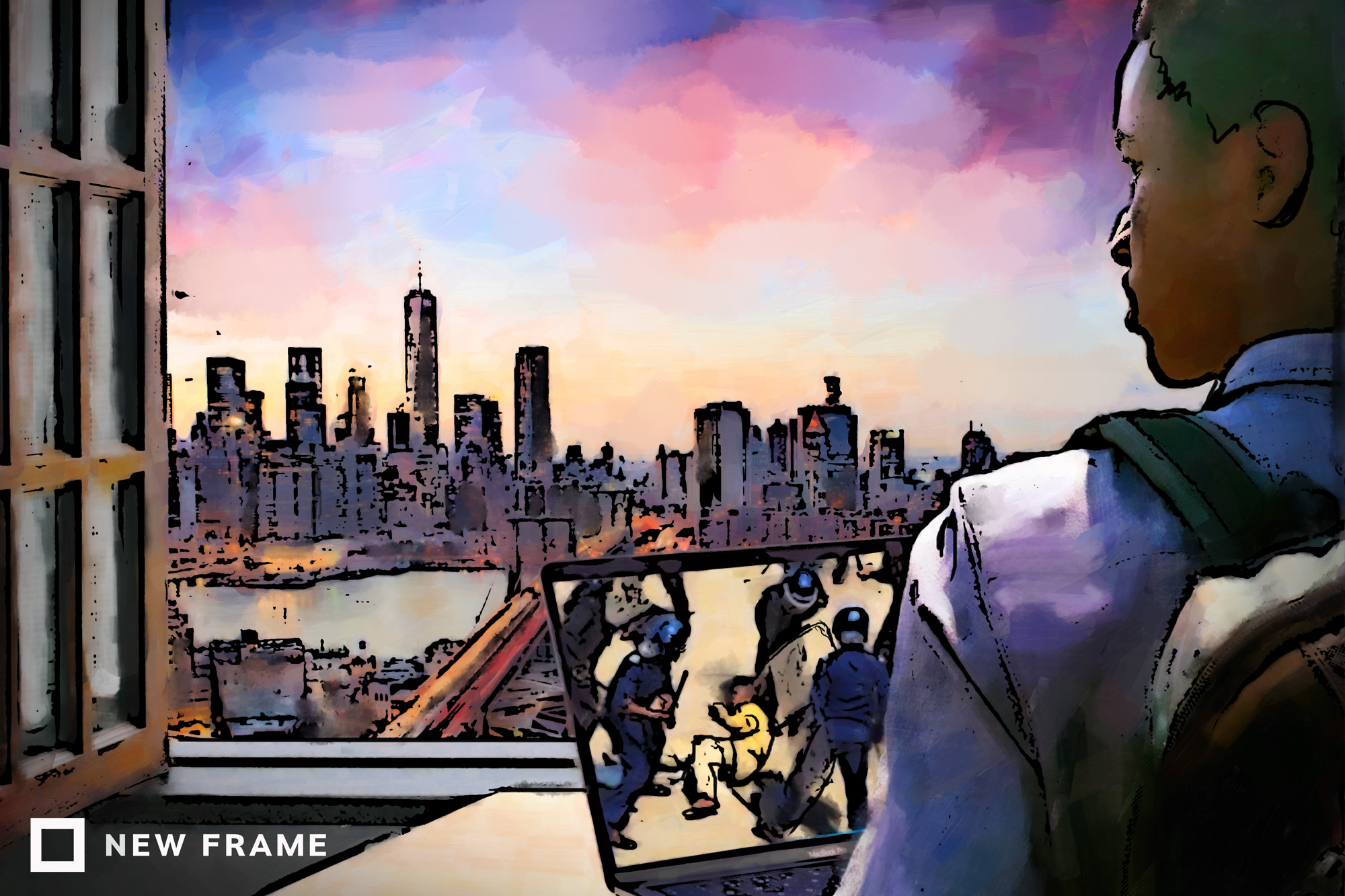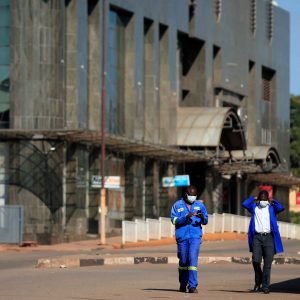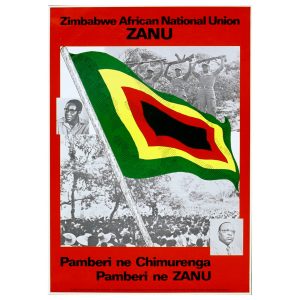The survivor’s guilt of a Zimbabwean in the US
Jordan Mubako shares his anguish at living a comfortable life as a student in the United States while his countrymen and women face daily challenges, from hunger to hyperinflation.
Author:
22 October 2020

The summer has come to an end here in Boston, Massachusetts. The outbreak of Covid-19 has me holed up in the university’s accommodation, staring at my screen and thinking about home. These are not pleasant thoughts.
They have not been for a while. Not much is left of my savings, but I don’t have any expenses. Not until the start of the school year, that is. I have just enough to make it to the end of the summer, till school starts again and I begin my job working in the campus library. I work there part-time, making about $200 a week.
My friend from back home in Zimbabwe jokes over the phone that that is more than his monthly salary. It is funny, until I remember that my friend is a trained engineer with three diplomas and I am only halfway through college. It’s been a little more difficult to laugh at that joke lately. The money people spend online on an impulse buy here in the United States totals the yearly salary of some people in Zimbabwe. I have bought shoes and neck chains on Amazon without batting an eyelash. At home, older, rustier and more permanent chains prevent people from enjoying the life I do. I type to the jangling of those chains.
Who is the writing for? I am not so sure. The overly rational part of me says it’s a need to try something new. Zimbabweans have tried everything. Protests and marches, solidarity campaigns and stayaways. Everything under the African sun. The most oppressed can sometimes be the most resourceful. Exploring options and charting new ground.
A country of contradictions
That sounds innocent enough, pure and simple. But the truth is rarely pure and never simple. Oscar Wilde said that. This came from The Importance of Being Earnest, his play about a guy who escapes his life in the countryside to masquerade as someone called Earnest. The pun on earnest is compelling but has a little too much nuance for my situation.
Where Earnest escaped the ennui of the countryside, I leave behind a country rife with contradictions. A “liberation party” determined to rob its citizens of every civil liberty. A former army general seeks treatment outside the country and is now elected minister of health, presiding over a failing system he himself does not trust.
More bitingly, an extremely educated population with record-high literacy rates struggles to find any gainful employment in a shrinking economy. About 60% of the nation lives below the poverty line. A nation once deemed the breadbasket of southern Africa now struggles with crippling food insecurity. Contradictions abound.
Related article:
At every job interview, internship opportunity, first date… the questions arise:
That’s a cool flag on your profile, is that from somewhere in Africa?
Mubako, that’s not a name I recognise. Where is it you call home?
Where are you from, from?
I like to think of myself as a Zimbabwean, but at times that sounds like a lie. It feels like a little white fib that helps lubricate daily interaction. No sense making it more complicated than it is, I reason. I tell them Zimbabwe. Undoubtedly, everyone smiles, with a perplexed eyebrow-raising telling me how interesting it is that I am from there.
More often than not, people do not know much more about my alleged country than Robert Mugabe and hyperinflation. Some see the flashing pictures on Instagram and police brutality. Others see military crackdowns and murdered civilians. If they keep up with the news, they see the abductions of innocent journalists and perpetually delayed bail hearings.
They may even know about the 700% inflation happening as we speak. Those really in the know may understand that healthcare workers can look forward to an unliveable wage of $59 a month. In solidarity, they may shudder to think of the world that 15 million people wake up to every day.
Hyperinflation, Mugabe and protests
If they do not care to know a whole lot, they tend to settle for Mugabe and inflation. That is the entirety of Zimbabwe’s canon here. No one cares to find out any more than that. It does not matter that the founder of Lyft was inspired by Zimbabwean ride-sharing models. No one cares to think that Strive Masiyiwa, one of Africa’s billionaires, hails from this nation.
Is it too much to ask for people to care about the wealth of writers, artists, visionaries, Olympic medalists, record holders and World Cup winners that hail from my great nation? Mostly, yes. Hyperinflation and Robert Mugabe.
Right now, the only news available is that of the protests, and the beatings. On millions of cellphones, the world can see first-hand how the government treats its people. The abuse is stark. I used to wish people saw more, but perhaps that is not the point right now. Maybe shock value is the best approach.
With our peaceful protesters on the ground being deemed terrorists, abducted, harassed and assaulted, maybe we should present the nation as the world has known it for so long: dysfunctional. With #ZimbabweanLivesMatter trending on social media, the world is starting to train its eyes on our country. Now is our chance. The iron is as hot as it will ever get. Many have written off my nation, held under the ruling Zanu-PF’s iron fist for four decades. But they say life begins at 40.
Related article:
To be Zimbabwean has always seemed to mean to suffer, and though I have been doing anything but that, countless Zimbabweans have not had any choice in the matter. Inaction is no longer an option. Where is my struggle? Where is my cross to carry? It is time for the diaspora to join hands with the Zimbabweans on the ground. How can we proudly claim Zimbabwe if we are not prepared to carry the pain and disappointment that comes with the citizenship?
I carry Zimbabwe everywhere I go. I drag my Fourth Street bus terminal sensibilities along with me every time I hire a taxi or hop into an Uber. Haggling on street corners made me a shrewd negotiator here, and all those hours spent baking under the blazing African sun means I can brush off the so-called heat that comes with summers in Boston.
Spells in Chiredzi made me no stranger to the sweltering humidity in Boston that can make breathing difficult. I carry all the good, but my load is a little light. I seem to have left behind the suffering.
Zimbabwe can be gruelling and heartbreaking. It is not unusual to see hundreds of schoolchildren at traffic light junctions, tapping their raw, bony knuckles against car windows to ask for spare change. They should not have to beg, and neither should their parents. Freedom to say what one thinks should not be a luxury, but as many Zimbabweans have to learn, freedom is not free.
But that is easy for me to say from my position of privilege. Many may demand, where is my suffering? Where is my oppression? I am one of the few that got out, one of the lucky ones. It is that survivor’s guilt that amplifies the clattering chains I hear when I go to sleep. It reminds me that back home, millions far braver than I am do the near impossible task of getting out of bed every morning and getting on with life. Every single day. Without fail.
Surely, I can crouch over my laptop and look for something to do or some way to help. It would be morally irresponsible not to play my part. This may change a few minds, this may make you pay closer attention. It may only succeed in irritating you. Any reaction will do. I’ll do anything to stop the rattling of those chains.


